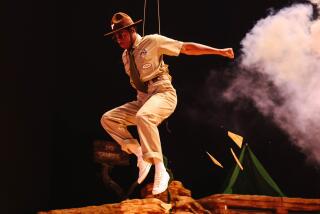THELONIOUS MONSTER IS HAVING FUN UNDER SIEGE
- Share via
At last count, says Thelonious Monster lead singer Bob Forrest, no fewer than six promoters/bookers had threatened to “ruin us in show business.”
“If they formed a coalition maybe they could get some momentum behind them,” Forrest adds with a laugh.
It’s not surprising that in its short (1 1/2 year) history, Thelonious Monster has engendered such a response. The seven-member band--Forrest, guitarist K.K., ex-Weirdos guitarist Dix Denny, drummer Pete Haskell, guitarist Bill Stobaugh, guitarist Chris Handsone and bassist Jon Huck--has made a name for itself as one of the most on-the-edge acts playing L.A, as well as one of the most controversial--at least among club personnel.
The four-guitar lineup immediately raises the hackles on sound men’s necks, while Forrest’s frequently caustic remarks from the stage are guaranteed to draw fire from bouncers, club managers, and anybody else within shouting distance.
The band’s battles with employees of clubs are legendary, ranging from a show at the Music Machine where the video screen was lowered on the group in the middle of a song, to the recent Roxy gig where Forrest found himself at the bottom of a pile of bouncers just after the group finished its set.
“The reason we get in all this trouble is because a bouncer doesn’t have any right to push people around,” declares Forrest, 25.
“They have no right to act like police. I just don’t like the way these clubs treat people. If you’re an opening band or if you paid to get in you don’t have to be treated the way clubs do. They push you around and think they’re so macho .”
“Things annoy (Bob),” observes drummer Haskell, 28. “If he thinks something is wrong or somebody is mistreating him it really grinds at him and he can’t keep it inside. He uses the stage as an arena where he can deal with it.”
Regardless of Forrest’s outspokenness, Thelonious Monster is unquestionably a force to be reckoned with. Drawing on a menagerie of sources that covers the gamut of rock music, the group has stitched together a creature the likes of which the club world hasn’t seen in some time.
The band’s debut album, “You’re Bummin’ My Life Out in a Supreme Fashion” (Epitaph Records), is one of the most outstanding local efforts this year, presenting a blend of styles and moods ranging from the punk-tinged chaos of “Life’s a Groove” to the psycho-barroom blues of “Let Me in the House” to “Happy .12 & .35,” a ballad highlighted by wonderfully sloppy New Orleans-style horns. Contributing to the LP were such local luminaries as James Chance, Tupelo Joe, Peter Case and members of the Circle Jerks, Red Hot Chili Peppers, Fishbone and the Fibonaccis.
Live, the Monster sound is massive, a guitar barrage that is pinpointed by virtuoso lead guitarist Dix Denny. With all those guitars on stage, one might expect a muddled mess, but somehow the group pulls it together--usually.
The recent show at the Roxy was a knockout: original, gritty, aggressive, and fun. Unfortunately, things don’t always go so smoothly, giving Thelonious Monster a reputation for being uneven--a “joke band,” according to some.
“Everybody used to think we were a joke band,” says K.K., who as a former member of the Screamers has been in on the local grass-roots rock scene since its mid-’70s inception.
“It really bugged us. We’d just play loose and have fun. It was because all this English gloom stuff was going on. You had to act serious or you weren’t taken seriously. We just did what we did and everyone thought we were a big joke and laughed at us when we said we were serious. Serious doesn’t mean having a scowl, it means you’re not going to go away, you’re going to persevere.”
“I think performing is the most important thing in the world,” adds Forrest. “I just don’t want to be some pretentious jerk like the Replacements or people that think they’re rock stars. I just want to have fun and have the people that were like me two years ago come and have fun. It’s not like it’s one big joke. We’re more serious than anyone.”
Being serious is something that Bob Forrest understands. A native of Palm Desert, he was once the eighth-ranked amateur golfer in California. When he was 13 he was the caddy for Lee Elder in the Bob Hope Desert Classic. Then he discovered rock ‘n’ roll and everything changed. He worked for a time as a club manager, booking shows at After Everything Else, the Cathay, the Sunday Club and the Lingerie.
“I thought, ‘All these bands I’m booking are so boring and serious,’ ” he recalls. “I wanted to be in a band but I was never confident enough to do it and then these guys asked me and I just got drunk enough one day and did it.”
The arrival of Forrest as lead singer wasn’t the only change the band has seen since its inception. Over the past 18 months, there have been so many shifts in personnel that it’s remarkable that the name is still the same. The Monster started by former drummer Pete Weiss has multiplied amoeba-like--especially in the guitar contingent.
K.K. recounts the rosters: “It’s been Bill and Chris, me and Bill, me and Scott Morrow, me and Bill and Scott Morrow, me and Dix, me and Dix and Chris, Dix and Chris and Bill, and now all four of us.”
Through all the changes, Thelonious Monster has remained fun , especially for the players. The energy and looseness of the band prompted both K.K. and Haskell--who went on tour with the group after only three rehearsals--to come out of retirement.
“I haven’t played drums in six years,” says Haskell. “I didn’t want to have anything to do with music anymore. And then these guys needed a drummer and I knew what it would be like so I said, ‘I will be in this band.’ Can you imagine any other band where you rehearse three times and then go on tour? That’s so great.”
The informal atmosphere of Thelonious Monster is one reason the band has become a critical favorite among scenesters and critics. And despite the sometimes acrimonious relationship with club employees, the band works constantly.
“People keep saying there are no places to play (in L.A.),” says Forrest. “We play all the time. There’s always someplace to play. People keep wanting to ruin us. We can’t go backwards. We have to keep moving.”
More to Read
The biggest entertainment stories
Get our big stories about Hollywood, film, television, music, arts, culture and more right in your inbox as soon as they publish.
You may occasionally receive promotional content from the Los Angeles Times.










